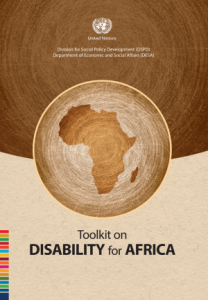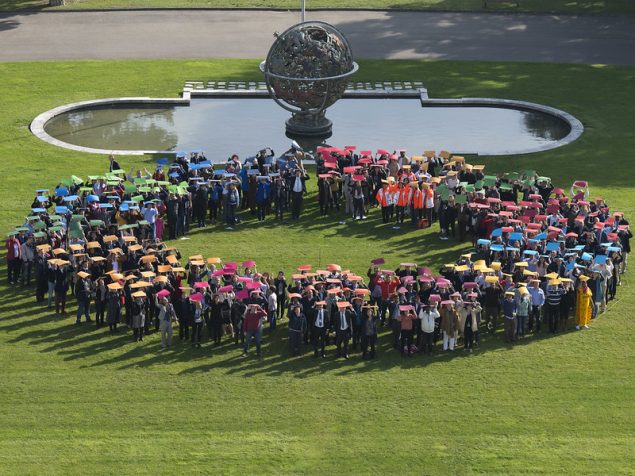Five United Nations world conferences held in the 1990s emphasized the need for a “society for all”, advocating the participation of all citizens, including persons with disabilities, in every sphere of society:
1. In 1992, the Rio de Janeiro Conference on Environment and Development encouraged Governments to give more attention to “demographic trends and factors … that have a critical influence on consumption patterns, production, lifestyles and long-term sustainability.” Other conferences advocated social initiatives for persons with disabilities to improve health care, universal education, elimination or reduction of violent conflict and a lessening of the poverty rate for persons with disabilities, all of which are key themes in promoting their equalization. The Rio document mirrors this trend and dedicates an entire section of the final report to “strengthening the role of major groups.”
2. The World Conference on Human Rights, held in Vienna in 1993, reconsidered universally recognized human rights instruments in the light of contemporary issues and produced a Programme of Action to guide human rights efforts forward in light of today’s realities. The Conference recognized that “all human rights and fundamental freedoms are universal and thus unreservedly include persons with disabilities.” The Vienna Conference recognized that any discrimination, intentional or unintentional, against persons with disabilities is per se a violation of human rights.
3. The International Conference on Population and Development, held in Cairo in 1994, recognized the importance of the equalization of opportunities for persons with disabilities. The objectives endorsed by the Conference included “ensuring realization of rights…and participation in all aspects of social, economic, and cultural life …to create, improve, and develop necessary conditions…[to] ensure equal opportunities …and dignity [while] promot[ing] self-reliance” of persons with disabilities.
4. During March 1995, the United Nations held the World Summit for Social Development in Copenhagen, Denmark. The Summit adopted the Copenhagen Declaration on Social Development and the Programme of Action of the World Summit for Social Development. The Declaration attempts to respond to the material and spiritual needs of individuals, their families and communities. It stipulates that economic development, social development and environmental protection are interdependent and mutually reinforcing components of sustainable development, and it cites disadvantaged groups such as persons with disabilities as deserving special attention. “Social development and social justice cannot be attained in the absence of peace and security or in the absence of respect for all human rights and fundamental freedoms.” –Copenhagen Declaration
5. The Platform for Action, adopted by the Fourth World Conference on Women (Beijing, 4-15 September 1995) stipulated areas of special concern and recognized that barriers to full equality for women can include factors such as their disability. Concerns relating to disability were also raised in the Beijing Declaration when the parties to the Conference committed to “intensifying efforts to ensure equal enjoyment of all human rights and fundamental freedoms for all women and girls who face multiple barriers to their empowerment and advancement because of factors such as…disability.”
In addition to these five major conferences which addressed disability, the decade of the nineties also held other milestones. On 20 December 1993 the General Assembly adopted the Standard Rules on the Equalization of Opportunities for Persons with Disabilities. The Rules served as an instrument by which policy makers could form technical and human rights cooperation within and among States, and between international organizations and governmental agencies.
The Rules include a monitoring mechanism to support their implementation. They called for the appointment of a Special Rapporteur to establish a direct dialogue between Member States, local non-governmental organizations and other intergovernmental bodies in order to implement the Standard Rules. In 1994, Mr. Bengt Lindqvist of Sweden was appointed Special Rapporteur on Disability of the Commission for Social Development by the Secretary-General. His mandate was renewed twice, in 1997 and in 2002, and he completed his duties in 2002. The Secretary-General then appointed Sheikha Hessa Khalifa bin Ahmed al-Thani of Qatar as the Special Rapporteur on Disability of the United Nations Commission for Social Development for the period 2003-2005. Her mandate was renewed in 2005, and will expire in 2009. In 1999 the Commission for Social Development decided that experts should serve a maximum term of six years.
At its thirty-fourth session, in April 1995, the Commission for Social Development requested that the Economic and Social Council adopt the mandate of ensuring an integrated approach to its work, taking into account the relationship between social and economic development.
In the area of children’s rights, UNICEF worked with UNHCR and the United Nations Centre on Human Rights to study the impact of armed conflict on children, as mandated by the General Assembly. During the World Summit for Social Development, a workshop on the rights of children with disabilities was organized by UNICEF and Rehabilitation International, a non-governmental organization.
The Statistical Division of the United Nations Secretariat, having noted the lack of sufficient, accurate and up-to-date information on the topic of disability, continued to undertake methodological work and gather relevant information. Its publications include the International Disability Statistics Data Base (1988), the Disability Statistics Compendium (1990), and the Manual for the Development of Statistical Information on Disability Programmes and Policies (1996). The Division produced ‘Guidelines and Principals for the Development of Impairment, Disability, and Handicap Statistics’ as well as a Handbook on Census and Survey Methods for Development of Impairment, Disability, and Handicap Statistics.
In 1997, anti-personnel mines were responsible for creating disabilities in 68 countries, four times as many as in 1994. The Mine Clearance Unit of the Department of Humanitarian Affairs conducted clearance programmes around the world.
Regional Commissions
The regional commissions pursued a number of assistance projects for persons with disabilities during the 1990s. The Economic Commission for Europe (ECE), through its project on rehabilitation engineering, conducted workshops in various countries to analyse the status of rehabilitation services, technical aids, the mobility of persons with disabilities, and the market potential for rehabilitation according to the needs of people with disabilities. Housing for persons with disabilities and improvements in the living conditions of the elderly and persons with disabilities were also on the ECE agenda.
The Economic and Social Commission for Asia and the Pacific (ESCAP) established a trust fund to promote the Decade of Disabled Persons in the Asia and Pacific Area (1993-2002). From 1983 to 1992, during the United Nations Decade, ESCAP organized training workshops on managing self-help organizations, conducting surveys, and preparing technical guidelines and hosting regional conferences for non-governmental organizations.
The Economic and Social Commission for Western Asia (ESCWA) worked in several countries still recovering from armed conflicts and in others where resources and services for persons with disabilities continue to be scarce.
In collaboration with the member States of the Arab Gulf Fund for the United Nations Development Organizations (AGFUND), the United Nations Voluntary Fund on Disability financed projects and programmes for persons with disabilities around the world.
The Economic Commission for Africa (ECA) created the African Rehabilitation Institute with assistance from the Organization of African Unity (OAU). Conceived in 1980 during the African Regional Conference on the International Year of Disabled Persons, the Institute worked for the development of regional programmes for the socio-economic integration of persons with disabilities in Africa.
The Economic Commission for Latin America and the Caribbean (ECLAC) focused its efforts on recovery from recent armed conflicts in the area, financial constraints and the elimination of negative cultural images of persons with disabilities.




